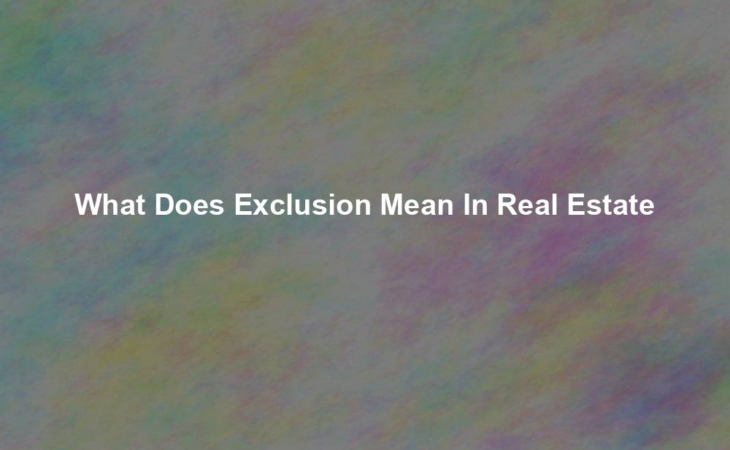
Exclusion in real estate is a concept that carries significant implications for both buyers and sellers. It refers to the act of intentionally excluding certain individuals or groups from accessing or participating in the real estate market. This exclusion can take various forms, including discriminatory practices, restrictive zoning, and economic barriers. The impact of exclusion in real estate is far-reaching, affecting individuals’ access to housing, their opportunities for wealth accumulation, and the overall equity and inclusivity of communities.
Throughout history, exclusion in real estate has been a pervasive issue, with discriminatory practices such as redlining and racial covenants being particularly prevalent. These practices systematically denied access to certain neighborhoods or restricted property ownership based on race, ethnicity, or other protected characteristics. While significant progress has been made in combating overt discrimination, more subtle forms of exclusion still persist. For example, economic barriers, such as high down payments or stringent lending requirements, can disproportionately impact marginalized communities. Addressing exclusion in real estate requires a multifaceted approach, including policy changes, education, and a collective commitment to promoting equitable access and opportunity for all individuals.
In real estate, exclusion refers to the act of excluding a property or certain items from a sale or listing agreement. This can be done to protect the seller’s privacy, retain personal belongings, or exclude certain fixtures. By including an exclusion clause in the agreement, both parties are clear on what is not included in the transaction. Exclusions can vary, so it is important to carefully review the agreement and communicate any specific items or terms.
In the world of real estate, exclusion refers to the act of excluding certain individuals or groups from accessing or participating in a property transaction. This exclusion can be based on various factors, including race, religion, gender, or other protected characteristics. It can manifest in different ways, from discriminatory practices in property listings to unfair treatment during the buying or renting process.
Exclusionary practices have long been a concern in the real estate industry, as they contribute to social inequality and perpetuate discrimination. Understanding the concept of exclusion in real estate is essential for recognizing and combating these practices, promoting fair and equal access to housing for all individuals.
Let’s explore the different aspects and implications of exclusion in real estate, from historical perspectives to current initiatives aimed at addressing this issue.
Here are some commonly asked questions about the concept of exclusion in real estate:
The term “exclusion” in real estate refers to the act of intentionally omitting a property or certain individuals from a listing agreement or a property transaction. It means that the property or person is intentionally left out or excluded from the sales or lease process.
In some cases, exclusion may be due to various reasons such as the owner’s request to keep the property off the market, the property not meeting certain criteria, or the exclusion of specific people from a transaction for legal or personal reasons.
There can be several reasons why a property owner or seller may choose to exclude their property from a listing agreement. One common reason is if the owner wants to maintain privacy and does not want the property publicly advertised or listed on the market. This is often the case with high-profile individuals or celebrities.
Additionally, a property may be excluded from a listing agreement if it does not meet the criteria or requirements set by the listing agent or agency. For example, if a property requires significant repairs or renovations, the owner may choose to exclude it until the necessary work is completed.
Excluding a property from a listing agreement does not necessarily have legal implications. However, it is important for the property owner and the listing agent to clearly communicate and document the exclusion to avoid any misunderstandings or disputes later on.
If there are any specific legal requirements or restrictions regarding property exclusions in a particular jurisdiction, it is advisable to consult with a real estate attorney to ensure compliance with the local laws.
Yes, in certain situations, individuals can be excluded from a property transaction. This can occur for various reasons, such as legal restrictions or personal preferences of the parties involved.
Some examples of individuals who may be excluded from a property transaction include co-owners who wish to sell their portion of the property separately, tenants who may have lease rights but are not involved in the sale or lease of the property, or individuals with certain legal or financial issues that may pose a risk in the transaction.
An exclusion in real estate can be lifted by mutual agreement between the parties involved. If a property owner initially excluded their property from a listing agreement, they can later decide to include it by discussing the matter with the listing agent or agency and signing an amended agreement.
Similarly, if an individual was excluded from a property transaction, they may have the opportunity to be included by resolving any legal or financial issues or by addressing concerns that led to their exclusion.
Exclusion in real estate refers to the act of intentionally leaving out certain individuals or groups
from accessing or participating in a particular real estate transaction or opportunity.
This exclusion can be based on various factors such as race, ethnicity, religion, gender, or socioeconomic status.
It is important in real estate to ensure that exclusion is avoided
and that all individuals have equal opportunities to participate and benefit from the market.